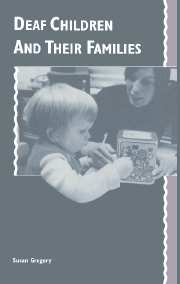Book contents
- Frontmatter
- Contents
- Foreword
- Preface to the 1995 edition
- Acknowledgements
- 1 The Handicap of Deafness
- 2 The Deaf Child at Play
- 3 Day-to-Day Living
- 4 Discipline and Punishment
- 5 Learning to Communicate: Equipment
- 6 Learning to Communicate: Education
- 7 Coming to Terms with Deafness
- 8 Family Life with a Deaf Child
- 9 The Family and the Community
- 10 Overview
- Appendix I The Interview Schedule
- Appendix II The Interview Situation: Advantages and Disadvantages
- Appendix III The Sample
- Bibliography
- Index
7 - Coming to Terms with Deafness
Published online by Cambridge University Press: 24 November 2009
- Frontmatter
- Contents
- Foreword
- Preface to the 1995 edition
- Acknowledgements
- 1 The Handicap of Deafness
- 2 The Deaf Child at Play
- 3 Day-to-Day Living
- 4 Discipline and Punishment
- 5 Learning to Communicate: Equipment
- 6 Learning to Communicate: Education
- 7 Coming to Terms with Deafness
- 8 Family Life with a Deaf Child
- 9 The Family and the Community
- 10 Overview
- Appendix I The Interview Schedule
- Appendix II The Interview Situation: Advantages and Disadvantages
- Appendix III The Sample
- Bibliography
- Index
Summary
In the last two chapters the value of the correct hearing aid and help from trained teachers was stressed as necessary to allow the deaf child to develop to his full potential. All in the field of deafness are agreed that for this help to be most effective it should start as early as possible in the child's life. This in turn implies that the early diagnosis of deafness is important. The official policy of the Department of Education and Science is that children should be screened early in life for possible hearing loss.
It is important that adequate screening for hearing loss of young children, both in early childhood and again when they start school should be undertaken. Ideally, all young children should have their hearing tested.
The view of the Secretary of State for Social Services is that such screening is being carried out.
Health Visitors are instructed in methods of screening young children for hearing impairment as part of their normal training, and it is routine for them to undertake this function. Information is not available on the extent to which children fail to be screened but I would expect the number to be small. Reorganisation of the Health Service will not affect the present screening arrangements except I am sure it will facilitate the general development of Health Services for children.
Though such early diagnosis is the expressed aim of many local authorities, the experience of many parents interviewed in this study did not bear this out.
- Type
- Chapter
- Information
- Deaf Children and their Families , pp. 129 - 155Publisher: Cambridge University PressPrint publication year: 1995



